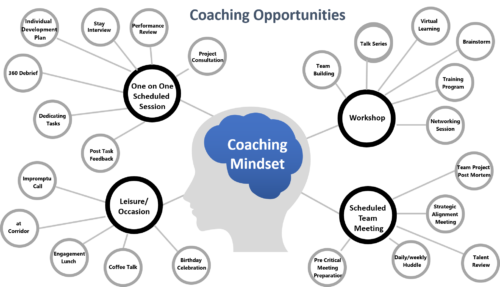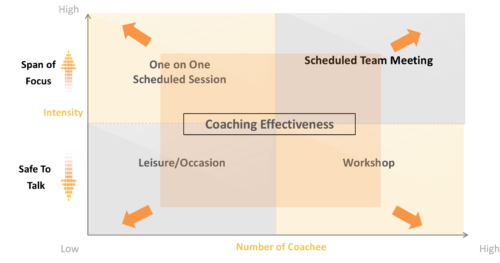Every conversation is an opportunity for a coaching conversation. Look for coachable moments!
2 August 2021
Generally, a professional coaching session will be conducted through a scheduled one-on-one coaching or group coaching. However, it’s not sufficient for a coaching culture creation to just have many one-on-one scheduled sessions. It has to create many conducive occasions for massive coaching conversations to happen in the organization. A leader with a coaching mindset should be able to maximize different situations, locations, and occasions for coaching conversations.

The above chart shows how a coach leader can do coaching at different occasions and events.
One-on-one scheduled coaching sessions can be done effectively in this way through a 360-degree debrief, Individual Development Plan discussion, performance review, project consulting, or when a manager dedicates a task and gives feedback to his/her team upon completion of the project.
Some managers have a problem initiating a one-on-one conversation. In particular, they do not have a clear objective of the conversation, so the interaction or discussion between the leader and the employee is only task-related discussion and not about employee discovery. Therefore, creating an opportunity for managers to have a scheduled one-on-one session is important to discuss topics such as an employee’s career development plan, monthly performance review, or post-task feedback, or to just conduct a stay interview to understand an employee’s status.
we understand also some managers are not comfortable with and do not have time for repetitive formal coaching sessions with their direct reports. But at least an one-on-one scheduled session with your direct report would be a great opportunity to interact, open up, listen, empathize, motivate, and unlock their potential with their coachee.
Another thing a manager can do when he/she has a bigger team to manage is to provide group coaching during scheduled team meetings. Daily and weekly huddles will work well if managers are able to balance between seeking opinions and dictating the meeting, such as listening to the challenges they have faced and provide direction during the team meeting. Other scheduled team meetings, like group discussions or premeeting discussions, could be an opportunity for a manager to coach the team. Examples of this include sales meetings with top clients, meeting regional MDs, crisis meetings, etc. The coaching meeting will increase participation and involvement, and more ideas will be collected for creating a better strategy.
Annual company events like talent reviews and strategic meetings will blend well with a coaching approach. A formal event like this does not necessarily need to be “too formal” or a “one-way communication” kind of event. The coaching approach will help liven up the discussion as it emphasizes two-way communication to enhance the attendee’s thought process. A coach needs to be a good facilitator who can facilitate the meeting meaningfully and help attendees see new opportunities and the perspective of other attendees.
A highly trained coach will not only utilize the scheduled session for coaching activities; the coach knows the power of leveraging leisure coaching or “corridor coaching” to coach anyone during casual events like lunches, unscheduled meetups, coffee talks, tea breaks, at corridors, or even in small talks during birthday or company events. Never underestimate the little talks that happen for even a few minutes during these occasions, which could raise massive awareness in a person.
The coaching questions that coaches could ask curiously during an unscheduled coffee talk could be something like “What would be your biggest takeaway from this year?” or “What are the things that you will do or will not do next year?” You can also give feedback to a person you know well through a question. “Hey, Lisa. I like your energy and focus, and you seem to always smile and bring positivity to everyone. May I know what is driving you to maintain this level of energy?”
During a short tea break at a workshop, the conversation can also be “What have you learned from this workshop?” or “How would you apply this to your job?” Scheduled coffee talk and lunch conversation should be internally focused as this occasion is a good opportunity to know them better and build a deeper relationship. Leisure coaching works particularly well for millennials as statistics show that they prefer getting feedback.
Workshop events like team buildings, training sessions, leadership training, virtual learnings, networking sessions, and conference events are also conducive venues for a coaching conversation. If you are a trainer, facilitator, host, or emcee who is hosting in these functions, you should spend more time engaging your audience through open-ended questions,
wrapping up the learnings at the end of a team building, incorporating coaching into the leadership program, asking powerful questions during training workshops, and asking meaningful questions during a networking session.
Apart from having coaching conversations at scheduled or unscheduled meetings, you can find many “coachable moments” as a manager in these times when your employee would benefit from reflection, insight, and feedback. You will see employees struggling with challenges, such as making and weighing a decision, facing a bottleneck, coping with stress, or having performance issues, and this will be the best time for a coaching conversation.

The above chart demonstrates coaching results and effectiveness. It will increase if a coach or manager fully taps on all coaching occasions and events because it will provide a balance between the formal and informal sessions, as a coach leader should do.
State of Focus
A formal coaching session helps coachees stay focused in an uninterrupted environment, and it increases the individual’s state of focus. Scheduled coaching sessions are always conducive for discussion, like brainstorming the action plan, discussing future plans, motivating employees to move forward, planning for organization/department pain points, and other strategy and planning-related discussions.
Formal coaching, like an individual development plan, a performance review, or a postmortem would be normally conducted in a private room with the use of facilities like flip charts, marker pens, papers, and materials that can be used to connect the discussed points to the conversation. The aim of a formal session is to help a coachee stay focused in creating an action plan. For example, creating a self-learning plan for the year during IDP coaching, improving certain behaviors during a performance review, and improving processes during a project postmortem.
Managers and leaders use coaching skills interchangeably in performance review sessions and employee development conversations. Topics addressed in these coaching conversations can include career aspirations or career pathing, skill-focused development, confidence building, communication skills, and a review of their performance every quarter.
However, it sometimes depends on the coachee’s openness and the coach’s capability to open up the conversation with the coachee in the scheduled one-on-one session setting. The coachee sometimes finds it difficult to open up fully, is unable to share their inner thoughts, or simply needs more time and patience from the coach. In this case, an unscheduled session, such as during lunch or coffee time, will work well as the coachee will loosen up and share more about themselves when the environment is less tense.
Having said that, a skilled coach can easily turn a scheduled one-on-one formal session such as a 360-degree assessment debrief into a “heart-to-heart” coaching session by creating a safe space for discussion.
Safe to Talk
The more casual the occasion or meeting, the safer the environment to speak. Occasions like lunch, casual talks at corridors, coffee talks, and attending a team building or a virtual event will be an ideal venue to discuss/coach on the “real problem,” identify real issues, understand the coachee’s real motivation and goal, and know something that normally you wouldn’t know from the coachee. This informal coaching session will create an opportunity to identify real challenges and help the coachee in setting the right goal.
Informal coaching will help coachees open up and build trust with the coach as well as help the coach understand the coachee’s goal and priority through clarifying the coaching goals and agenda. As for a professional coach’s concern, clarifying the real challenge and creating the goal are the most difficult parts of the coaching agenda. Occasions like lunches, coffee talks, birthday celebrations, conversations at corridors, and unscheduled calls will make the environment safe and conducive to a coaching conversation. Coachees will take off their guards and be willing to share more with their coaches.
Conclusion
Coaching is not only the manager’s job, it’s everyone’s job. The above coaching interactions can be done by individuals, peers, colleagues, and anyone who values collaboration and empowerment. So, start your coaching conversation and look for coachable moments!







